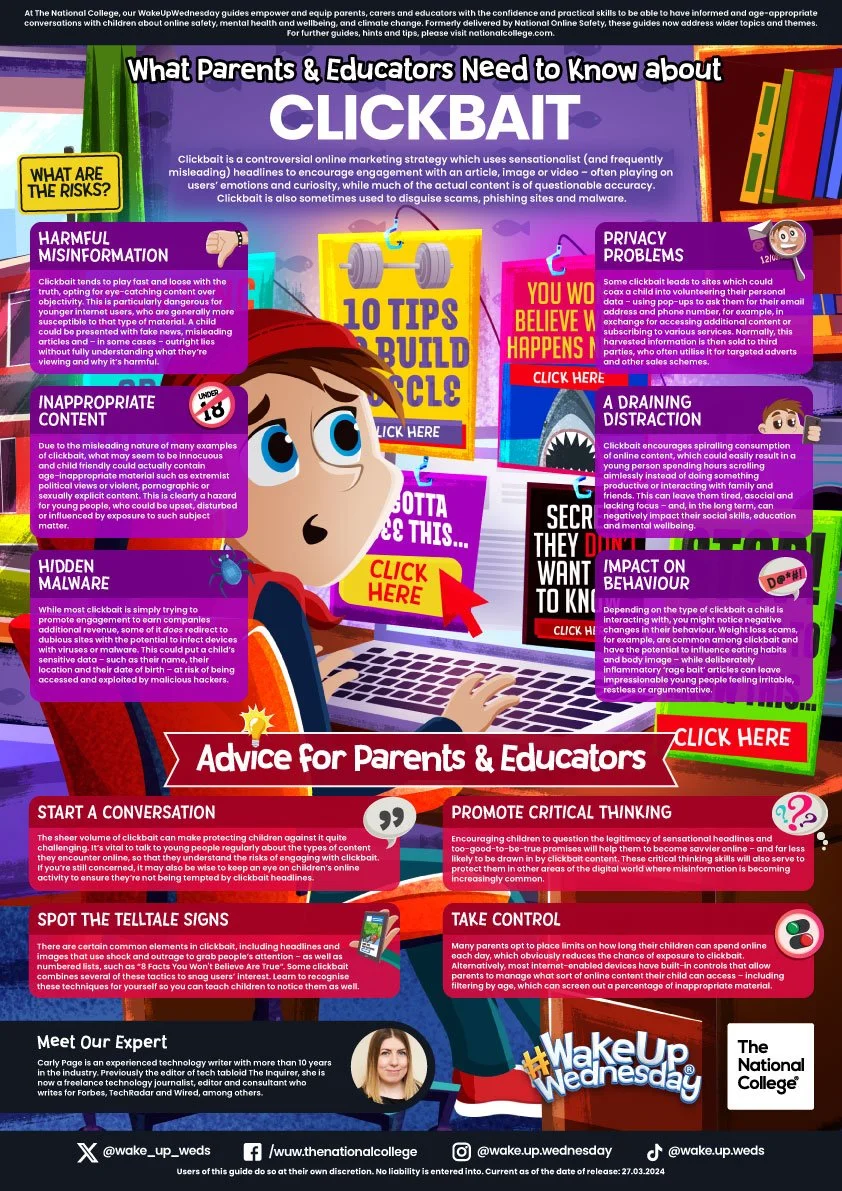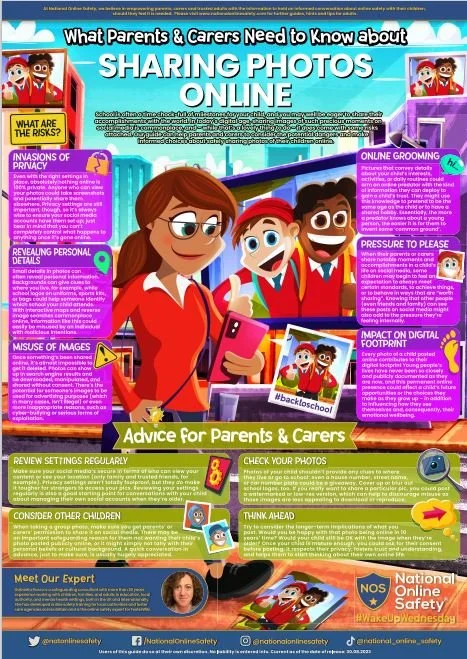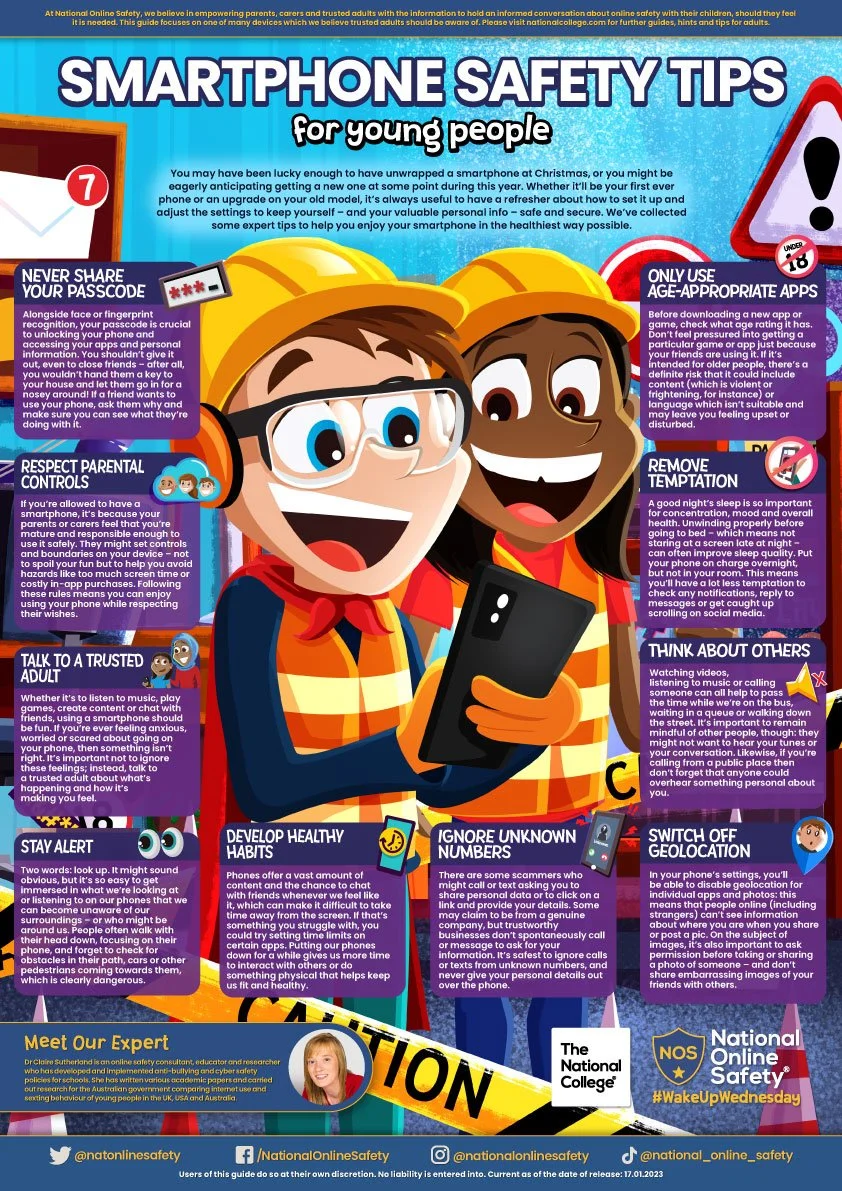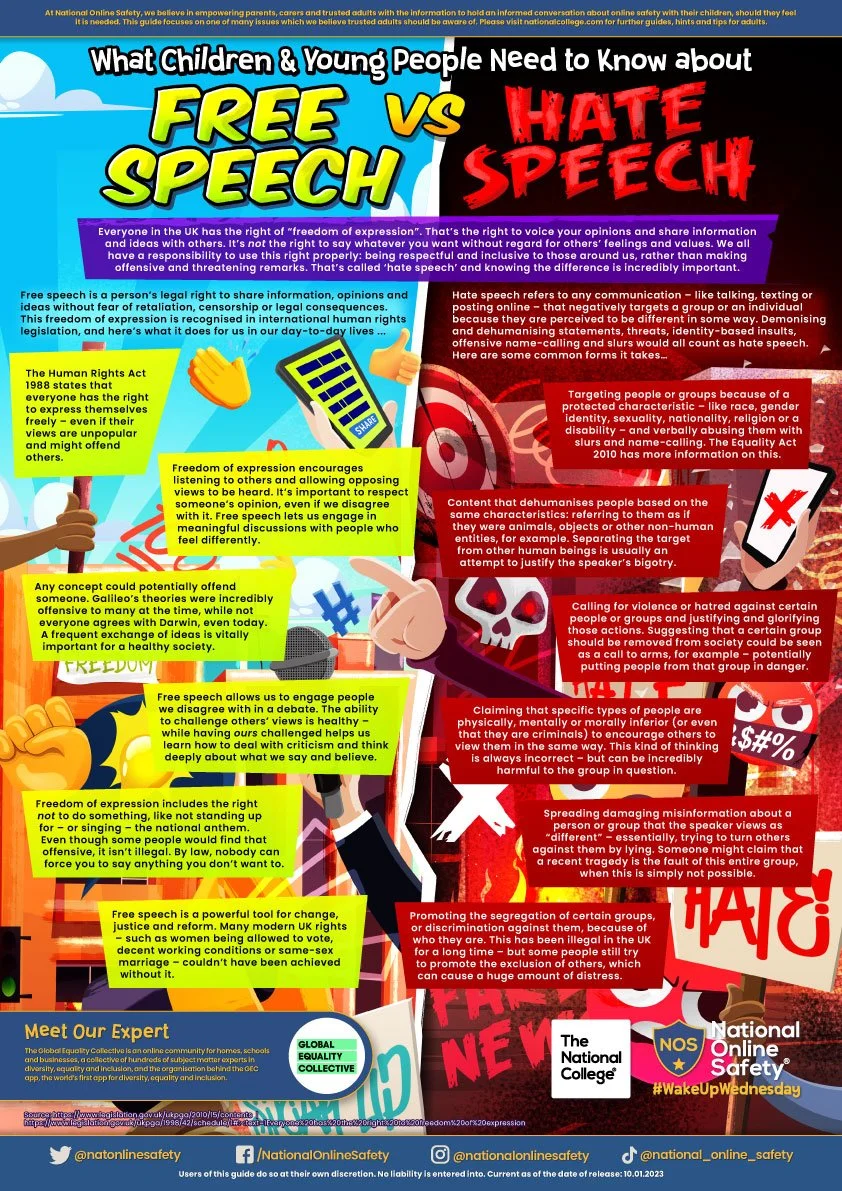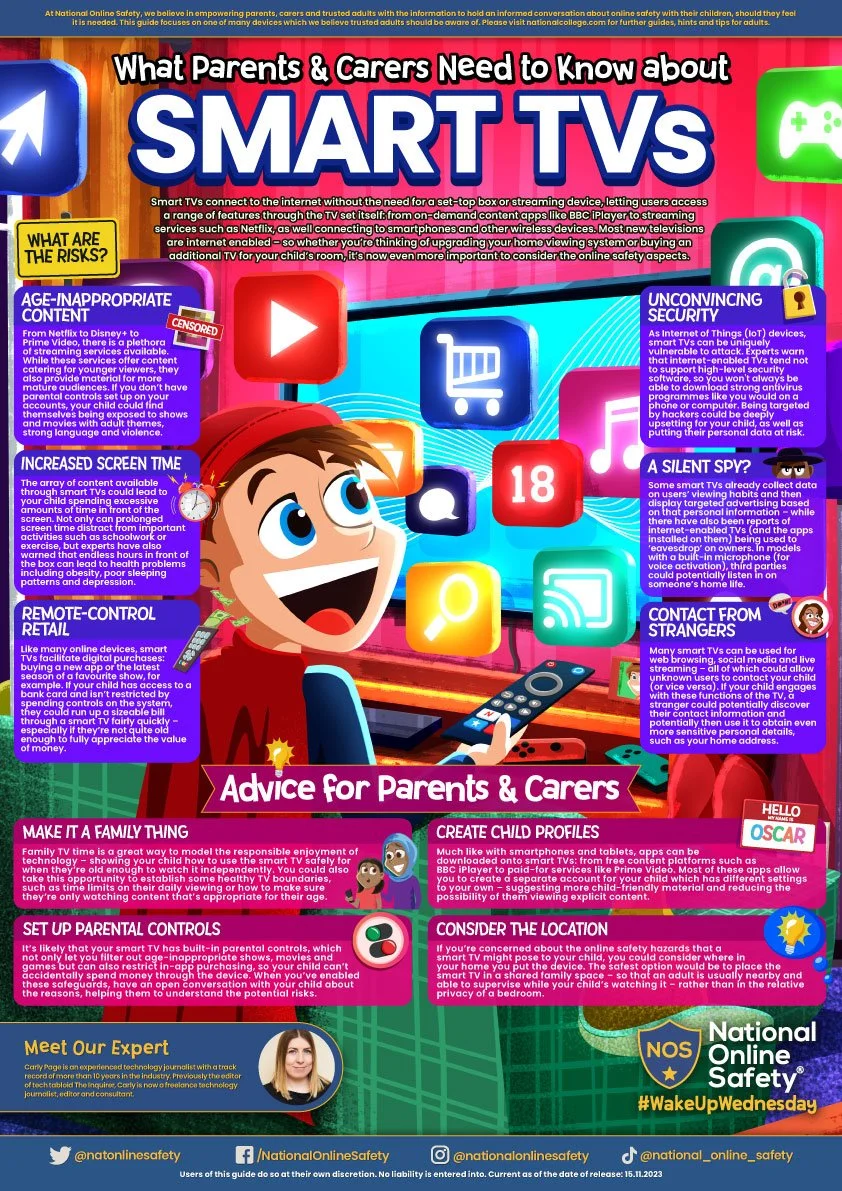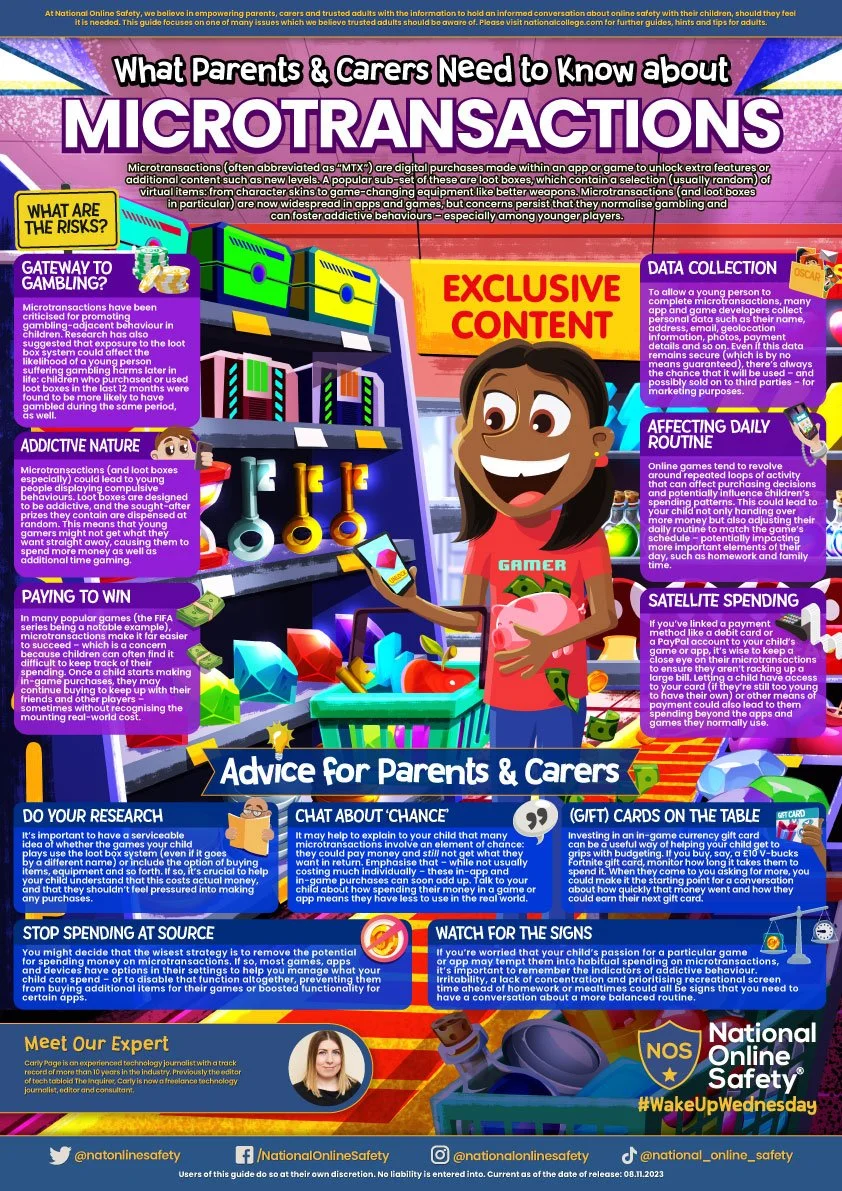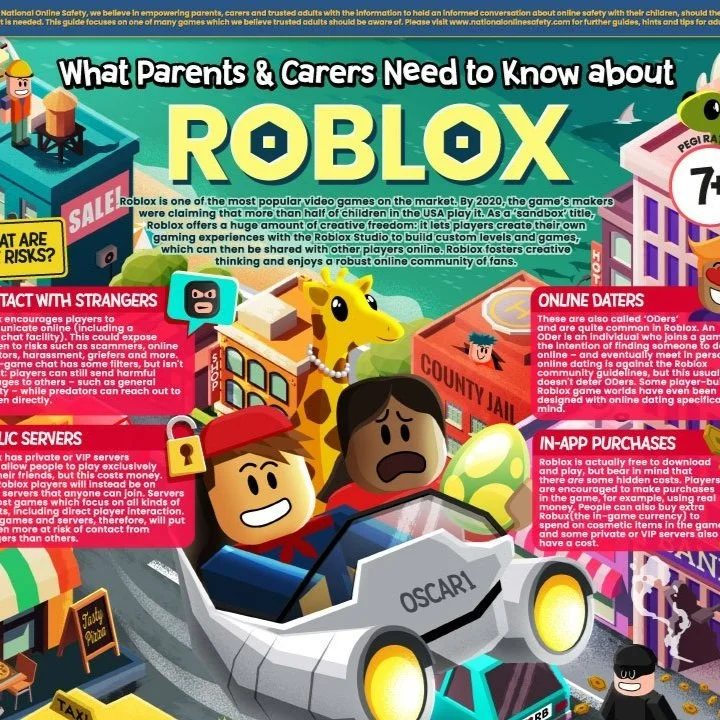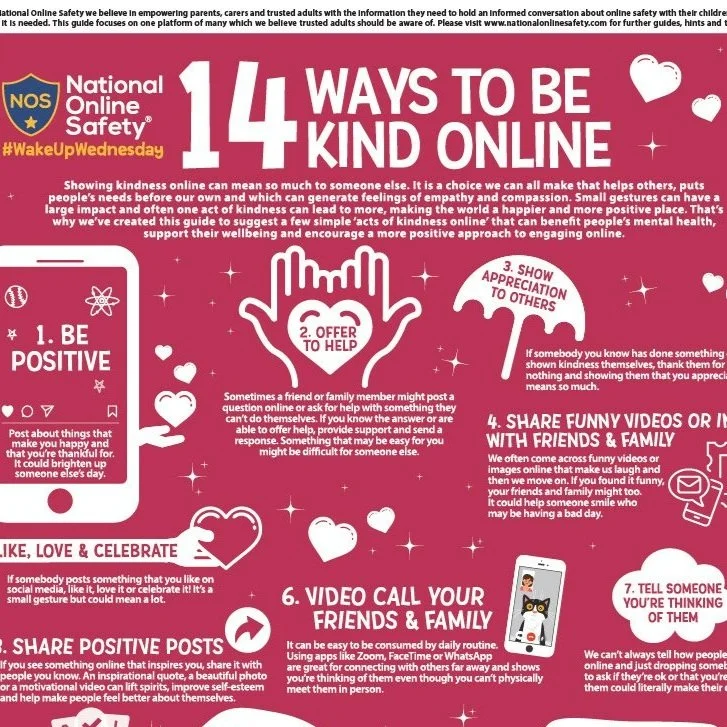ONLINE Safety
Everything Parents and Carers Need to Know About….
With children spending more time than ever before online, it is important that, as adults, we keep them safe. Each week we will share with you different ways to help you keep your child safe while online. Below is the link to a really helpful app that has been launched – National Online Safety app – a useful app for parents to keep up with new games and apps that the children may use.
https://apps.apple.com/gb/app/national-online-safety/id1530342372
https://play.google.com/store/apps/details?id=uk.co.nationaleducationgroup.nos
Click on the image to access any of the ‘What Parents Need to Know About…’ leaflets below:
Clickbait
This week: What Parents Need to Know About Clickbait.
While scrolling online, you’ll almost inevitably have come across posts or links with headlines like “You Won’t Believe These 10 Crazy Facts about …”. Such lurid language – and the often-dubious nature of the content it promotes – has become something of a running joke on the internet. Yet while these articles are often laughed at by communities online, they can have an insidious side.
Clickbait, as it’s known, can frequently function as part of a trap: intended to draw users in for the sake of advertising revenue or, in worse cases, masking an attempting to collect their personal information. This #WakeUpWednesday guide explores the various risks of clickbait and offers some top tips for evading the pitfalls of this controversial marketing technique.
What Parents Need to Know About Sharing Photos Online.
One of the more heartwarming, life-affirming aspects of social media is being able to share special moments in our children’s lives with family and friends: from the first day at school or blowing out birthday cake candles to smiling holiday selfies and cute Hallowe’en costumes. Is there, however, such a thing as too much sharing – and can it actually put children in danger?
With potential risks such as accidentally displaying identifying details (images showing where a child lives or what school they go to, for example) and photos being seen and saved by strangers, perhaps we need to take a little more caution over what we post and where we post it. Our #WakeUpWednesday guide runs through some safety considerations when sharing images.
What Parents Need to Know About Monkey
With Omegle finally shutting down in late 2023, the top spot among video chat services is up for grabs – and Monkey has its eyes set on the crown. Randomly matching its users for 15-second conversations, the platform’s developers claim to have created a dynamic online space for people to make new connections and, potentially, even some new friends.
Despite these innocuous-sounding intentions, however, Monkey has been criticised for moderation which may not be comprehensive enough to defend against the obvious dangers that unregulated, random video calls pose to the younger element of the site’s userbase. Our #WakeUpWednesday guide tells trusted adults what they need to know about Monkey.
What Parents Need to Know About Persuasive Design Online
For many companies who operate in the online space, attention and engagement are the holy grail. Social media sites in particular make deliberate creative choices to keep people scrolling, reading, watching and clicking. This phenomenon is known as ‘persuasive design’ and it’s being employed in the vast majority of the digital world’s most popular destinations.
A study by the charity 5Rights Foundation concluded that “…the brain's response to rewards and punishments can be leveraged through persuasive design to keep children online.” To tie in with Safer Internet Day 2024, our #WakeUpWednesday guide can help to educate youngsters on the effects of persuasive design – and suggests ways to insulate themselves from its influence.
What Parents Need to Know About Smartphone Tips for Young People
According to Ofcom, 69% of under-18s use a smartphone as their main method of going online. Additionally, 49% of children use them for online gaming – putting smartphones only behind consoles (59%) as the device of choice for playing games on. Most people won’t require such statistical evidence, however, to acknowledge the huge importance of phones to young people.
Given that Santa’s recent visit is likely to have bestowed smartphones on an even greater number of young people, it’s a particularly opportune moment to ensure that children are able to use their handsets responsibly – and, above all, safely. From passcodes to parental controls, and from screen time to scams, our #WakeUpWednesday guide has the essential advice.
What Parents Need to Know About Free Speech v Hate Speech
Freedom of expression is enshrined in international law. Some individuals, however, misunderstand the right to share their opinions as a license to target others with the most horrendous prejudice. So how do we balance people’s prerogative to have their voice heard against everyone’s right to live in a respectful, inclusive society?
This conflict frequently unfolds in the digital world. Online posters can be falsely accused of hate speech, while actual hate is often defended as merely being ‘free speech’. To help children and young people learn to identify the boundaries and recognise genuine hate speech when they see it, our #WakeUpWednesday guide provides some helpful definitions and guidelines.
What Parents Need to Know About Disney+
In 2019, media titan Disney launched its own streaming platform, intending to challenge the likes of Netflix and Amazon Prime. Giving (often exclusive) access to shows and movies – such as the legendary studio’s animated classics and the revered Star Wars back catalogue – Disney+ has been a colossal success, proving popular with viewers of all ages.
Despite Disney’s reputation for wholesome, child-friendly content, however, there’s far more material available on their platform – some of which is aimed exclusively at adults. This could easily fly under the radar, given the company’s general image. Our #WakeUpWednesday guide has useful tips to help your family sit back, relax and enjoy what Disney+ has to offer.
What Parents Need to Know About Black Friday and Cyber Monday
Gone are the days of Black Friday only existing in the physical environs of the high street. Now, both this retail landmark and its sister event, Cyber Monday, see deals and discounts displayed across almost every online retailer. The array of reductions makes this an ideal moment to treat a loved one (or yourself!) to those treasured items for considerably less than their usual cost.
The frantic dash for the best bargains online, however, also harbours several risks: chiefly, cybercriminals hoping to exploit people’s excitement and hoodwink them out of their hard-earned cash. Our #WakeUpWednesday has some expert pointers on keeping your both your money and your personal information safe while still making the most of the spectacular sales.
What Parents Need to Know About Smart TVs
Smart TVs have become more affordable in recent years, making them readily available to most consumers. These more advanced systems offer numerous features beyond those of a normal television set – chiefly, the ability to access the internet and interface with popular streaming services without the need for a set-top box or other intermediary device.
This increased functionality, however, also brings additional threats to privacy, security and more – as you’d perhaps expect from any device capable of going online. As TV is such a cornerstone of our home lives, these dangers can be uniquely difficult to manage. Our #WakeUpWednesday guide breaks down the major risks, with tips on helping children to enjoy TV … stress free.
What Parents Need to Know About Microtransactions
Microtransactions figure in the business model of many game and app developers, allowing them to bring in ongoing revenue as users continue to pay for extra features and content; even software that’s initially free to download can be monetised in this way. It’s a system which has featured in many of younger gamers’ perennial favourite franchises, from Fortnite to FIFA.
As well as encouraging regular spending, however, microtransactions – especially the increasingly common use of loot boxes – have also been scrutinised for what many argue is a resemblance to gambling, with the potential to foster addictive behaviours. Our #WakeUpWednesday guide tells parents and carers what they need to know about microtransactions.
What Parents Need to Know About X
The social media network formerly known as Twitter has undergone numerous alterations since its change of ownership and rebranding as X – and many of these recent developments have proved controversial. With any user now simply able to pay a fee for account verification, for example, the once-reliable ‘blue tick’ system has become largely meaningless.
It’s just one of several changes that have set the social media giant on what many consider a concerning path in online safety terms. Our #WakeUpWednesday guide provides a run-down of the most significant tweaks made to X; their potential safeguarding implications; and how to help ensure young people minimise the risks while they continue to use the service.
Supporting Children to Deal with Upsetting Content
They might not be able to pinpoint its location on a map, and they might not fully grasp the historical and political drivers behind the conflict – but in this age where news, images and video can cross continents in seconds, many children are now aware of the terrible recent events in Israel. It’s a situation, of course, that could cause youngsters extreme distress and worry.
Our #WakeUpWednesday guide contains some valuable pointers for supporting children to deal with upsetting content they’ve encountered online – whether that’s the attacks in Israel, ongoing worries over the environment, or something else entirely. Our tips will assist trusted adults in helping young people to process any negative emotions that they may be feeling.
Roblox
Roblox is one of the most popular video games on the market. By 2020, the game’s makers were claiming that more than half of children in the USA were playing it. As a ‘sandbox’ title, Roblox offers a huge amount of creative freedom: it lets players create their own gaming experiences with the Roblox Studio to build custom levels and games, which can then be shared with other players online. Roblox fosters creative thinking and enjoys a robust online community of fans.
In the guide, you'll find tips on avoiding potential hazards such as online daters, in-app purchasing and contact with strangers.
Among Us
Created in 2018 by a small indie studio that (at the time) had only four employees, Among Us has become one of the gaming world’s biggest breakout hits of recent years. In 2020, for example, it was the world’s most-downloaded mobile game. Its simplicity helped Among Us to resonate with younger players in particular: the game’s second largest audience slice is the 13–18 age bracket.
While the 7+ age rating, emphasis on teamwork and cartoonish, colourful graphics all suit a young fan-base, however, the game does carry more serious risks than betrayal by a team-mate or an untimely on-screen demise – with in-game purchases and possible contact from strangers on our #WakeUpWednesday guide’s list of hazards that trusted adults should bear in mind.
WhatsApp is the most widely used messaging platform on the planet, with over two billion users (forecast to become three billion by 2025), across more than 180 countries. The majority of those people (70%) open the app at least once a day – but what exactly are they seeing? Contact from strangers, fake news and convincing scams are all among the service’s well-documented hazards.
According to Ofcom, WhatsApp is used by more than half of 3- to 17-year-olds in the UK (including one in three from the 8–11 bracket), despite its 16+ age restriction. If your child hops onto WhatsApp to stay in touch with friends or family, our updated #WakeUpWednesday guide to the service contains the key details you’ll need to support them in doing it safely.
Snapchat
Snapchat is a photo- and video-sharing app through which users can chat with friends via text or audio. Images and videos can be shared with specific friends, or as a ‘story’ (documenting the previous 24 hours) which is visible to a person’s entire friend list. Snapchat usage rose significantly during the lockdown periods, with many young people utilising it to stay connected with their peers. The app continues to develop features to engage an even larger audience and emulate current trends, rivalling platforms such as TikTok and Instagram.
In the guide, you'll find tips on avoiding potential risks such as sexting, visible location and contact from strangers.
Pokemon GO
Pokémon GO has been among the world’s most popular mobile games since its spectacular release in 2016. It's recently enjoyed a resurgence, thanks partly to people combining entertainment and exercise during lockdown. In Pokémon GO – like the Pokémon TV show, trading card series and other video games – players capture, train and battle with their Pokémon creatures: physically exploring locations while using augmented reality via their phone’s screen. The game generally provides a positive experience, but there are still some safety concerns to consider.
In the guide, you'll find tips on avoiding potential risks such as environmental hazards, strangers and data collection.
Fortnite Chapter 2
Fortnite: Chapter 2 has finally landed! With a whole host of new in-game features including a brand-new map, more water-based activities, upgraded character skins and a more streamlined arsenal of weapons, this Fortnite is promising to be the best yet. Almost all of the changes are cosmetic which means the concept of the game remains the same, with players still aiming to be the last man standing. Players will no doubt find the game much more enjoyable with so much more to explore. For parents and carers however, it pays to remain vigilant.
In this guide, you'll find tips on a number of potential risks such as gaming addiction, gaming with strangers and overspending.
Fortnite Chapter 3
First released in 2017, Fortnite has become one of the most popular games in the world. It currently has around 350 million registered players. Developed by Epic Games, it began life exclusively as a ‘battle royale’ contest, where up to 100 online player characters would fight – with weaponry including rifles, handguns and rocket launchers – to be the last one standing. Today, it features multiple modes which each offer something different (although some modes, such as ‘Save the World’, are only available on certain platforms).
In the guide, you'll find tips on a number of potential risks such as scams, in-app purchases and user-controlled content.
Fortnite Chapter 4
If you know any young gamers, you’ll almost certainly be familiar with Fortnite. It’s one of the most popular video games on the planet – up alongside other mega-hits like Minecraft, Roblox and Call of Duty in terms of its sheer number of fiercely dedicated players. Fortnite currently has more than 400 million devotees worldwide – around 25 million of whom play it every day.
Given Fortnite’s relatively young user-base, though (as many as one in four pre-teens are reported to have played the game, despite its PEGI 12 age rating), it’s prudent not to conflate immense popularity with absolute safety. Our #WakeUpWednesday guide assesses the latest version for potential pitfalls that parents and carers of young Fortnite fans should be aware of.
In the guide you'll find a number of potential risks such as compulsive playing, audio chat with other gamers and in-game spending.
14 Ways To Be Kind Online
Showing kindness online can mean so much to someone else. It is a choice we can all make that helps others, put people’s needs before our own and which can generate feelings of empathy and compassion. Small gestures can have a large impact and often one act of kindness can lead to more, making the world a happier and more positive place. That’s why we’ve created this guide to suggest a few simple ‘acts of kindness online’ that can benefit people’s mental health, support their wellbeing and encourage a more positive approach to engaging online.
In the guide, you'll find tips such as offering to help others, share positive posts and thinking before you comment.
Online Day 2023
The global Safer Internet Day (February 2023) with celebrations and learning based around the theme ‘Want to talk about it? Making space for conversations about life online’. In the UK, In the UK, we are celebrating by putting children and young people’s voices at the heart of the day and encouraging them to shape the online safety support that they receive.
Sometimes it is difficult to keep an eye on what your child is doing on the internet. This is often because our children are more knowledgeable than us, when it comes to using technology. However, there is one key thing that we can do and that is always insist that children use the internet in the same room as an adult.
Secondly, it is important to remember that many of the social networking sites have an age limit of thirteen, so children at Harnham C of E Junior School are not old enough to hold accounts with Facebook, You Tube and so on.
If you are unsure about how to help your child, please call in to school and we will be pleased to help.
You can follow the links at the base of this page for further information. A number of leaflets are also available. If you wish to receive paper copies of any of these leaflets then please ask in school.
Can you imagine life without the internet?
We use the internet often in school to help us with our work and, used sensibly, this is the most amazing learning tool.
At Harnham C of E Junior School we take your safety on the internet very seriously.
We teach Online Safety regularly to remind all pupils and staff how to take care and what to do should something go wrong. We also offer information to parents on how to keep their children safe when on the internet at home.
Helping your child stay safe
The best way to help your child to be safe when using the internet and new technologies is to talk to them and make sure they understand these simple rules, so that they can self-censor:
You should never give out personal details to online ‘friends’. Use a nickname when logging on and don’t share full name, email address, mobile number or school name.
Never give out any photos, including photos of family or friends – any picture or video online can be changed or shared without permission.
Talk to your child about what they are doing online and who they are talking to. Get them to show you how to use things you are not familiar with. Keeping the computer in a family room means that you can share your child’s online experience, they are less likely to act inappropriately (i.e. via webcam) and their online ‘friends’ will see they are in a family room.
If something pops up on the screen that your child does not understand or does not like, or if your child receives a message that upsets them, remind them to tell you or a trusted adult straight away. They should save the message and not reply to it.
Don’t reply to spam and junk emails and texts, or send them to anyone else – just delete them.
Don’t open files sent from people you don’t know. They could contain a virus, or worse – an inappropriate image or film.
An online ‘friend’ is anyone you have not met in real life; no matter how long you have been friends with them. Just like in real life, avoid talking to strangers online and only accept friend requests from people you know.
Help your child to understand that some people lie online and that it’s better to keep online ‘mates’ online. They should never meet up with any online ’friends’ without an adult they trust.
Make sure they know how to block someone online and report them if they feel uncomfortable.
Make sure your child feels able to talk to you. Let them know that it’s never too late to tell someone if something makes them feel uncomfortable. Don’t blame your child – let them know you trust them.
What else can you do?
Make sure your privacy settings are high on your phone / devices / computer. Set children’s modes where you have them on your devices.
Use password protection where you can. Set up individual accounts for your children and monitor their use regularly. Avoid sharing your account admin passwords with your children – things like App Store, iTunes, Google play etc. – to prevent children downloading inappropriate apps.
Where possible use the government initiative on Parental Controls on home broadband. Every major broadband service provider offers this – find out more at choose.net/media/guide/features/parental-controls-broadband-internet-safety.html. Your broadband provider will have added them already – you don’t need to do anything.
Read the school’s Anti-Bullying policy to find out more about cyberbullying.
Please download our Online Safety policy (.pdf)
Useful websites
There are a great deal of excellent websites to remind you of all the important points you need to remember, and here are a few to help:
10 Internet Safety Tips - Staying Safe Online | SWGfL
https://www.google.co.uk/goodtoknow/familysafety/
https://www.childnet.com/young-people/primary
Remember: If you are unsure what to do, talk to an adult and they will help you.
More Online Safety Factsheets for Parents
The Key Safeguarding Training Centre has produced the following information leaflets for parents aimed at keeping your child safe online.


